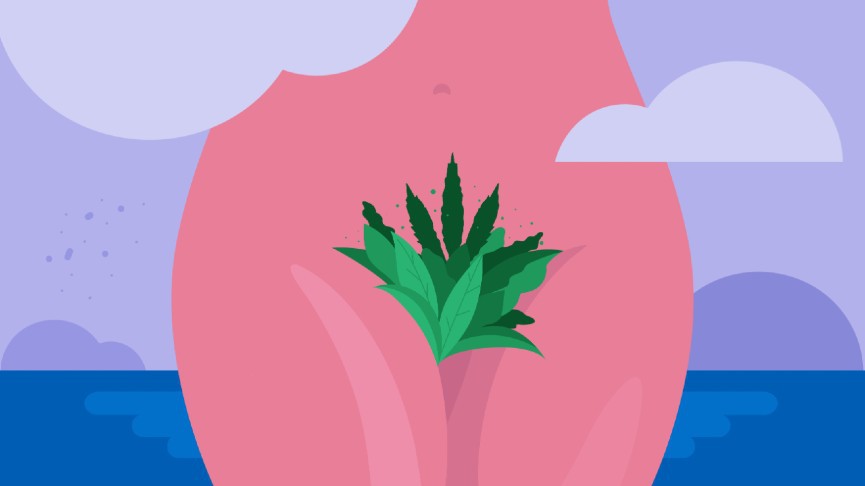Cannabis and Reproductive Health

Long considered taboo and criminalized in many parts of the world, cannabis use is becoming widely more accepted and common. This is especially important for the many people that rely on its potent healing properties for medicinal purposes.
Plant Power
Let’s set one thing straight. While conversations around cannabis come with much political and societal baggage and complications, at the end of the day it is a plant – marijuana. A plant that when used conscientiously can offer numerous benefits.
Cannabis helps many people in a variety of areas of life, especially reproductive healthcare. There are records of people using cannabis or hemp to treat gynecological issues dating back to 2000 BCE in ancient Mesopotamia.
Having said that, of course, different people react differently to it, much as they would with any other plant-based medicine. Learning how to integrate cannabis use into your reproductive healthcare plan can help ease cramps, treat pain from endometriosis and PCOS, allow for mindblowing sex, and more!
Before we dive into how you can use cannabis to support your reproductive health, it’s important to understand how the different compounds of the plant interact with the human body.
The one that most people tend to be familiar with is THC or tetrahydrocannabinol. THC is the main psychoactive compound in cannabis, aka the one that makes you feel high. In addition to giving a buzz, THC can also help with anxiety, nausea, pain, and insomnia.
CBD, or cannabidiol, has grown in popularity in recent years, and many people rely on it for relief from inflammation, chronic and acute pain, anxiety, migraines, and mental health disorders. It is typically non-psychoactive, although some people may experience drowsiness and/or dizziness.
While both compounds are active in most strains of cannabis and hemp, some are more predominantly THC or CBD. Both compounds are typically consumed by smoking the flower of the plant or a concentrate, by ingesting a concentrated oil or tincture, or by vaporizing it.
Companies like Foria have even created intervaginal or anal CBD suppositories that can be used to treat symptoms of vulvodynia, endometriosis, menstrual cramps, painful sex, and more.
Non-Pharmaceutical Relief
Reproductive health disorders like endometriosis and polycystic ovarian syndrome (PCOS), come with intense pain that can interfere with someone’s daily life, especially around or during menstruation.
While many people have relied on cannabis for relief from the pain of endometriosis, new research shows that the plant may also help treat the root cause of these disorders. Cannabis and hemp have the potential to stop or prevent the process of cell proliferation and migration.
THC has the power to stop the increased number of endometrial cells that occurs in someone with endometriosis. While CBD can stop these cells from migrating and adhering to other organs in the abdomen.
When used together, CBD and THC can be a powerful remedy in what’s considered an incurable disease. In addition to treating the body on a cellular level, CBD also helps treat inflammation, a chronic occurrence for someone with endometriosis.
PCOS is a result of an imbalance of sex hormones and can cause irregular or absence of periods, weight gain, fatigue, and more. Cannabis can be incredibly helpful in treating chronic pain and depression that can come with PCOS. Much like endometriosis, PCOS is an inflammatory disorder, which cannabis is of course beneficial in regulating.
People experience painful periods for a variety of reasons outside of endometriosis and PCOS. Oftentimes there’s no cure, as it’s difficult to pinpoint the root of the issue. In these cases, cannabis and hemp can be incredibly beneficial in managing period pain and discomfort.
Got a bad case of cramps?
CBD and THC can both help ease the aching. Lost your appetite? THC can help with that. Feeling nauseous from said cramps? CBD is your friend. On top of that, cannabis can also help with any PMS anxiety or depressive symptoms that may arise.
One way to integrate cannabis and hemp into your self-care routine without the risk of feeling high is by using it topically. Topical CBD balm can be applied to the pelvic area, abdomen, and back to help ease cramps and discomfort.
Plant Pleasure
With the rise of cannabis use, companies have begun developing incredibly innovative products like CBD lube. That’s right! More and more companies are making lube containing CBD that can help relax the pelvic floor, decrease pain during sex, prevent irritation, and overall make for a wildly pleasurable experience.
For people who experience pain during sex, CBD lube gives them a way to allow for penetration, when it was otherwise a source of anxiety. People with vaginas who have experienced trauma, whether it be sexual or an injury, have been able to utilize CBD to enjoy sex once again – or for the first time. Talk about life-changing!
Cannabis is fantastic when used medicinally, but can also offer incredible benefits to your sex life when used recreationally. Thanks to its euphoric and uplifting effects, this wonderful flower can help you connect to your partner – or yourself, deepen your orgasms, and stay present in your body!

Natasha (she/her) is a full-spectrum doula and health+wellness copywriter. Her work focuses on deconstructing the shame, stigma, and barriers people carry around birth, sex, health, and beyond, to help people navigate through their lives with more education and empowerment. You can connect with Natasha on IG @natasha.s.weiss.



So happy I stumbled upon your article on this staggeringly painful pcos night.
You’ve brought me such relief.
I hope the heavens Blessing pour upon your sweet self ✨✨✨
Sage
🌌
Thank you 🙂